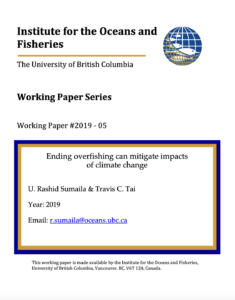U. Rashid Sumaila and Travis C. Tai
Fisheries Economics Research Unit, Institute for the Oceans and Fisheries & School of Public Policy and Global Affairs, the University of British Columbia
Abstract
Marine fish stocks and the ecosystems they inhabit are in decline in many parts of our ocean, including in some European waters, because of overfishing and the ecosystem effect of fishing in general. At the same time, climate change is disrupting the physics, chemistry and ecology of the ocean, with significant consequences on the life it holds. While the positive effects of mitigating climate change on the ocean and marine life are currently being documented, papers that examine how ending overfishing could increase ocean resilience to climate change are less common. The goal of this paper is to review the current literature and conduct an analysis that demonstrate that ending overfishing and reducing other negative ecosystem effects of fishing would make fish stocks and marine ecosystems more resilient to climate change. Our findings suggest that fish are no different from people in that a healthy person is more likely to survive an epidemic than a person who is less healthy.
Working Paper: Ending Overfishing Can Mitigate Impacts of Climate Change
Press release: Ending Overfishing Is Opportunity to Combat Climate Crisis – Report
Powerpoint from webinar, September 2nd 2019: Ending overfishing can mitigate impacts of climate change
Webinar video, September 2nd, 2019

